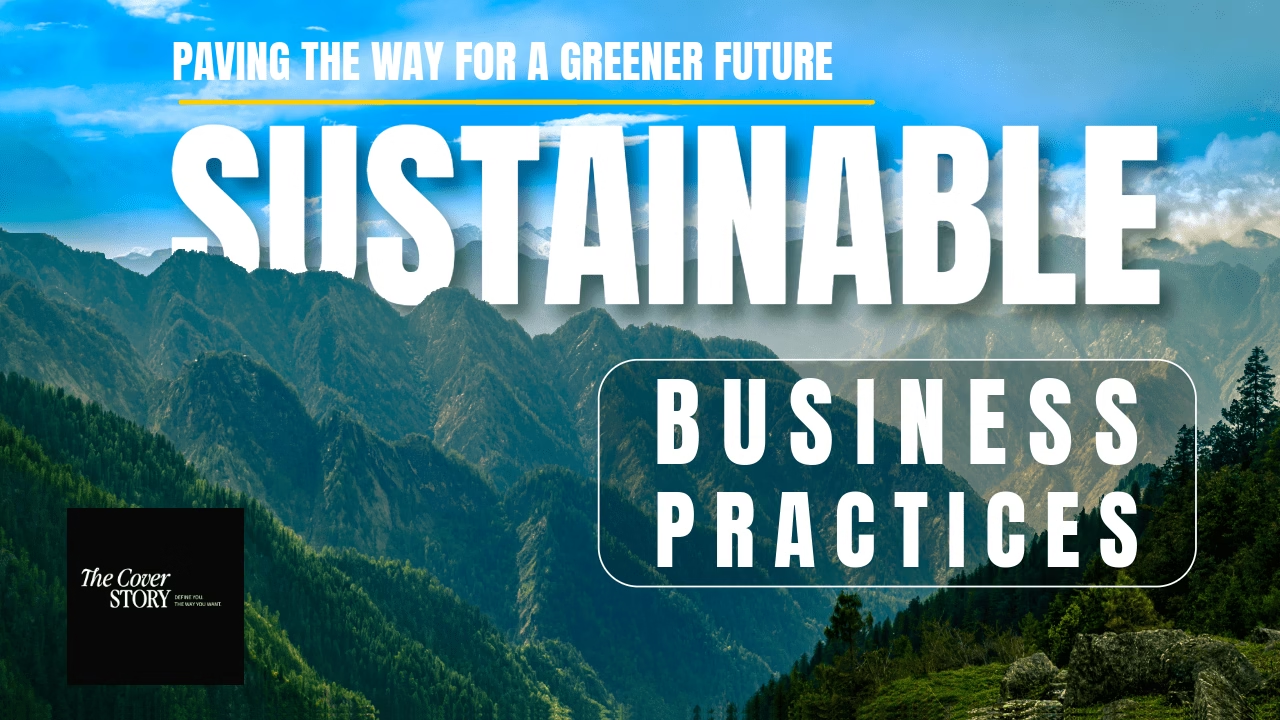Trends Story
Sustainable Business Practices: Paving the Way for a Greener Future

In today’s rapidly evolving business landscape, the concept of sustainability has become a pivotal consideration for organizations across industries. As the world grapples with the consequences of climate change, resource depletion, and environmental degradation, businesses are recognizing the critical role they play in mitigating these challenges. Sustainable business practices encompass a holistic approach that balances economic growth with environmental stewardship and social responsibility.
These practices aim to minimize the negative impacts of business operations on the planet while maximizing positive contributions to society. By adopting sustainable strategies, companies can not only reduce their ecological footprint but also enhance their competitiveness, attract conscious consumers, and foster long-term resilience in an ever-changing global market.
The importance of sustainable business practices
The importance of sustainable business practices cannot be overstated in the modern era. As the world’s population continues to grow and natural resources become increasingly strained, the need for businesses to operate in an environmentally responsible manner has become a pressing concern. Unsustainable practices not only contribute to environmental degradation but also pose significant risks to businesses themselves, including regulatory penalties, supply chain disruptions, and reputational damage.
Moreover, consumers are becoming increasingly conscious of the environmental and social impacts of the products and services they consume. Companies that fail to adopt sustainable practices risk losing market share to more eco-friendly competitors and alienating a growing segment of environmentally conscious consumers.

Benefits of implementing sustainable practices
Implementing sustainable business practices can yield numerous benefits for companies, ranging from cost savings and operational efficiencies to enhanced brand reputation and customer loyalty. Here are some of the key advantages:
- Cost Savings: By optimizing resource usage, reducing waste, and embracing renewable energy sources, businesses can significantly reduce their operational costs over time.
- Regulatory Compliance: As governments around the world implement stricter environmental regulations, sustainable businesses are better positioned to comply with these mandates, avoiding costly fines and legal liabilities.
- Competitive Advantage: Companies that prioritize sustainability often gain a competitive edge by differentiating themselves in the market, attracting environmentally conscious customers, and fostering innovation.
- Employee Engagement: Sustainable practices can boost employee morale, productivity, and retention by aligning with personal values and creating a sense of purpose within the organization.
- Investor Confidence: Investors are increasingly favoring companies that prioritize sustainability, recognizing the long-term financial benefits and risk mitigation associated with responsible business practices.
- Brand Reputation: By demonstrating a commitment to environmental and social responsibility, businesses can enhance their brand reputation, build trust with stakeholders, and foster customer loyalty.
Examples of successful sustainable businesses
Many companies across various industries have embraced sustainable business practices and reaped the benefits of their efforts. Here are a few notable examples:
- Patagonia: The outdoor clothing company is renowned for its commitment to sustainability, using recycled materials, implementing fair labor practices, and promoting environmental activism.
- Unilever: The consumer goods giant has set ambitious sustainability goals, including reducing its environmental footprint by half by 2030 and achieving net-zero emissions by 2039.
- Tesla: The electric vehicle manufacturer has revolutionized the automotive industry by producing energy-efficient and environmentally friendly vehicles, contributing to the transition towards sustainable transportation.
- IKEA: The furniture retailer has implemented various sustainability initiatives, including sourcing sustainable materials, investing in renewable energy, and promoting circular economy principles.
- Starbucks: The coffee chain has implemented various sustainability measures, such as offering reusable cups, sourcing ethically grown coffee, and reducing waste through recycling and composting programs.
Sustainable practices in different industries
Sustainable business practices can be tailored to suit the unique needs and challenges of various industries. Here’s a glimpse of how sustainability is being embraced across different sectors:
- Manufacturing: Implementing lean manufacturing processes, using eco-friendly materials, optimizing energy efficiency, and adopting closed-loop systems to reduce waste.
- Agriculture: Promoting sustainable farming practices, such as organic farming, crop rotation, and integrated pest management, to reduce the environmental impact of agricultural activities.
- Energy: Transitioning to renewable energy sources like solar, wind, and hydroelectric power, while also promoting energy efficiency and conservation measures.
- Hospitality: Reducing water and energy consumption, minimizing food waste, and implementing recycling and composting programs in hotels and restaurants.
- Fashion: Embracing sustainable materials, promoting circular fashion models, and implementing ethical labor practices throughout the supply chain.
- Finance: Incorporating environmental, social, and governance (ESG) factors into investment decisions, and offering sustainable financing options for green projects and initiatives.
Steps to implement sustainable business practices
Implementing sustainable business practices is a multi-faceted process that requires a strategic approach and a long-term commitment. Here are some steps businesses can take to embark on their sustainability journey:
- Conduct a Sustainability Assessment: Evaluate your current operations, identify areas for improvement, and establish baseline metrics to measure progress.
- Develop a Sustainability Strategy: Define clear goals, targets, and timelines for your sustainability initiatives, aligned with your company’s values and objectives.
- Engage Stakeholders: Involve employees, suppliers, customers, and local communities in your sustainability efforts to foster collaboration and buy-in.
- Implement Operational Changes: Adopt sustainable practices across your operations, such as energy efficiency measures, waste reduction strategies, and responsible sourcing practices.
- Measure and Report Progress: Regularly monitor and report on your sustainability performance, using standardized metrics and frameworks to ensure transparency and accountability.
- Continuous Improvement: Continuously evaluate and refine your sustainability initiatives, embracing innovation and adapting to new challenges and opportunities.
- Collaborate and Learn: Participate in industry associations, partnerships, and knowledge-sharing platforms to learn from best practices and collaborate with others on sustainability initiatives.
Challenges and barriers to sustainable business practices
While the benefits of sustainable business practices are compelling, companies may encounter various challenges and barriers during the implementation process. Some of the common obstacles include:
- Initial Investment Costs: Transitioning to sustainable practices often requires upfront investments in new technologies, infrastructure, and training, which can be a financial barrier for some businesses.
- Organizational Resistance: Implementing sustainable practices may require significant cultural shifts and operational changes within an organization, potentially facing resistance from employees or stakeholders accustomed to traditional methods.
- Regulatory Hurdles: Navigating complex and varying environmental regulations across different regions can be challenging, particularly for businesses operating globally.
- Supply Chain Complexities: Ensuring sustainable practices throughout the entire supply chain, from sourcing raw materials to distribution, can be a complex and challenging task.
- Lack of Consumer Awareness: Despite growing awareness, some consumers may still prioritize cost over sustainability, creating a potential barrier for businesses that prioritize sustainable practices.
- Greenwashing Concerns: The rise of greenwashing, where companies make misleading or exaggerated claims about their environmental efforts, has led to consumer skepticism and mistrust.
To overcome these challenges, businesses must foster a culture of sustainability, invest in employee training and education, collaborate with stakeholders, and prioritize transparency and accountability in their sustainability reporting.
Tools and resources for sustainable business practices
Implementing sustainable business practices can be facilitated by leveraging various tools and resources available to companies. Here are some examples:
- Sustainability Reporting Frameworks: Organizations like the Global Reporting Initiative (GRI) and the Sustainability Accounting Standards Board (SASB) provide standardized frameworks for measuring and reporting sustainability performance.
- Eco-labeling and Certifications: Third-party certifications, such as LEED (Leadership in Energy and Environmental Design) for buildings, Energy Star for appliances, and Fair Trade for ethical sourcing, can help businesses demonstrate their commitment to sustainability.
- Life Cycle Assessment (LCA) Tools: LCA tools enable businesses to evaluate the environmental impacts of their products or services throughout their entire life cycle, from raw material extraction to disposal or recycling.
- Energy Auditing Software: These software solutions help businesses identify areas of energy inefficiency and recommend strategies for improving energy performance.
- Sustainable Supply Chain Management Systems: Specialized software and platforms assist businesses in managing their supply chain sustainability, tracking environmental and social impacts, and ensuring compliance with regulations and standards.
- Green Building Rating Systems: Rating systems like LEED, BREEAM (Building Research Establishment Environmental Assessment Method), and Green Globes provide guidelines and certifications for sustainable building design, construction, and operation.
- Sustainability Consulting Services: Professional consulting firms offer expertise and guidance in developing and implementing sustainable business strategies, conducting assessments, and navigating regulatory landscapes.
By leveraging these tools and resources, businesses can streamline their sustainability efforts, measure their progress, and demonstrate their commitment to responsible practices.
The role of consumers in promoting sustainable businesses
While businesses play a crucial role in driving sustainability, consumers also have a significant influence in shaping the market towards more eco-friendly practices. Consumers can contribute to the promotion of sustainable businesses in the following ways:
- Conscious Purchasing Decisions: By choosing products and services from companies that prioritize sustainability, consumers can vote with their wallets and incentivize businesses to adopt more environmentally responsible practices.
- Advocating for Transparency: Consumers can demand greater transparency from businesses regarding their environmental and social impacts, pushing companies to be more accountable and transparent about their sustainability efforts.
- Supporting Sustainable Initiatives: Participating in campaigns, petitions, and movements that advocate for sustainable business practices can raise awareness and exert pressure on companies to prioritize sustainability.
- Reducing Consumption and Waste: By adopting a more mindful and minimalistic approach to consumption, consumers can reduce their environmental footprint and encourage businesses to adopt more sustainable production and distribution models.
- Engaging with Businesses: Providing feedback, suggestions, and constructive criticism to businesses can help shape their sustainability strategies and ensure they align with consumer expectations.
By exercising their purchasing power and influence, consumers can play a pivotal role in driving the transition towards a more sustainable and eco-friendly business landscape.
Building a greener future through sustainable business practices
Sustainable business practices are not just a passing trend but a necessary paradigm shift for ensuring a greener and more prosperous future. As the world grapples with the consequences of environmental degradation and resource depletion, businesses have a critical responsibility to adapt their operations and embrace sustainability as a core value.
By adopting sustainable practices, companies can not only mitigate their environmental impact but also unlock numerous benefits, including cost savings, enhanced brand reputation, and increased competitiveness. However, the journey towards sustainability requires a long-term commitment, strategic planning, and collaboration among stakeholders.
Governments, industries, and consumers must work together to create an enabling environment that incentivizes and supports sustainable business practices. Through collective action, innovation, and a shared vision for a greener future, we can pave the way for a more sustainable and resilient global economy.Embrace sustainable business practices today and join the movement towards a greener future. Visit [website link] to learn more about our sustainability initiatives and how you can contribute to a more eco-friendly and responsible business landscape. Together, we can create a better world for generations to come.

Business Story
U.S. Bank Announces Official Sponsorship of the 2026 Special Olympics USA Games

U.S. Bank Will Serve as the Official Volunteer Sponsor and Competitive Cheer Sponsor of the Games
As the Official Volunteer Sponsor, U.S. Bank will help lead and mobilize more than 10,000 incredible volunteers who are vital to the success of the Games. As the Official Competitive Cheer Sponsor, U.S. Bank will support this exciting event which will take place at Ridder Arena at the University of Minnesota campus. Competitive Cheer was introduced to the USA Games in 2022 featuring 150 athletes and Unified partners, and now more than 14,000 cheer athletes and Unified partners annually train and compete in the United States. “Hosting the Special Olympics USA Games here in our headquarters market of Minneapolis is such an honor,” said Reba Dominski, Senior Executive Vice President and Chief Social Responsibility Officer for U.S. Bank. “We are looking forward to showing these amazing athletes and their families just how supportive this community is and how excited we are to welcome them to the Twin Cities.” U.S. Bank joins a growing list of passionate partners for the 2026 Special Olympics USA Games. As a proud partner, U.S. Bank will also have many of its own employees playing a significant role in supporting the Games through volunteering at various venues and helping to champion inclusion throughout the Games. “We are deeply thankful for U.S. Bank’s collaboration in making the 2026 Special Olympics USA Games a reality,” said Christy Sovereign, Chief Executive Officer of the 2026 Special Olympics USA Games. “Their contribution empowers us to highlight the incredible human spirit, where competitive cheer and, most importantly, the tireless dedication of our many volunteers, will unite to celebrate the extraordinary abilities of our athletes.” The 2026 Special Olympics USA Games will be one of the largest sporting events in the U.S. that year, bringing together thousands of athletes of all abilities, coaches, volunteers and fans from all 50 states. To learn more about the 2026 Special Olympics USA Games, please visit 2026specialolympicsusagames.org.As the Official Volunteer Sponsor and Official Competitive Cheer Sponsor, U.S. Bank will help lead and mobilize over 10,000 volunteers and support the competitive cheer event at Ridder Arena on the University of Minnesota campus.

Business Story
Want AI-Driven Productivity? Redesign Work

To unlock AI’s full potential, leaders must rethink traditional job structures, embracing a comprehensive redesign of work processes that integrates human ingenuity with machine efficiency.
The Promise and Pitfall of AI Integration
Artificial Intelligence (AI) has emerged as a transformative force in the modern workplace, offering unprecedented opportunities for efficiency and innovation. However, merely overlaying AI onto existing workflows often yields limited benefits. To truly harness AI’s capabilities, organizations must fundamentally rethink and redesign work processes.
Deconstructing Work: Breaking Down Traditional Roles
The first step in this transformation involves deconstructing existing job roles into their constituent tasks. This granular analysis allows organizations to identify which tasks can be automated, which require human judgment, and which can be enhanced through AI collaboration. By understanding the specific components of each role, businesses can more effectively integrate AI where it adds the most value.
Redeploying Tasks: Aligning Work with the Right Resources
Once tasks are deconstructed, the next phase is redeployment—assigning tasks to the most appropriate resources. This might involve automating routine tasks, reallocating complex problem-solving to human experts, or creating hybrid roles where humans and AI systems work in tandem. Such strategic alignment ensures that each task is performed by the entity best equipped to handle it, optimizing efficiency and effectiveness.
Reconstructing Work: Building New Processes for a New Era
The final step is reconstructing work processes to reflect the new distribution of tasks. This involves designing workflows that seamlessly integrate AI tools, redefining job descriptions, and establishing new performance metrics. By rebuilding processes from the ground up, organizations can create agile, responsive systems that leverage the strengths of both human and artificial intelligence.
Embracing a Skills-Centric Approach
Central to this transformation is a shift from role-based to skills-based workforce planning. By focusing on the specific skills required for each task, organizations can more effectively match employees to roles, identify skill gaps, and develop targeted training programs. This approach not only enhances productivity but also empowers employees by aligning their work with their strengths and career aspirations.
Fostering a Culture of Continuous Learning
As AI continues to evolve, so too must the workforce. Organizations should cultivate a culture of continuous learning, encouraging employees to develop new skills and adapt to changing technologies. Providing access to training resources, promoting cross-functional collaboration, and recognizing adaptability as a key performance metric can help embed this culture throughout the organization.
Ensuring Ethical and Transparent AI Use
While integrating AI into work processes offers numerous benefits, it also raises ethical considerations. Organizations must ensure transparency in AI decision-making, protect employee data privacy, and address potential biases in AI algorithms. Establishing clear guidelines and oversight mechanisms is essential to maintain trust and integrity in AI-enhanced workplaces.
Conclusion: A Strategic Imperative for the Future
Redesigning work to integrate AI is not merely a technological upgrade; it’s a strategic imperative that requires thoughtful planning, cultural change, and ongoing commitment. By deconstructing traditional roles, redeploying tasks effectively, and reconstructing processes to align with modern capabilities, organizations can unlock new levels of productivity and innovation. Embracing this holistic approach positions businesses to thrive in an increasingly AI-driven world.
#AIProductivity
#WorkRedesign
#FutureOfWork
#HumanAIcollaboration
#DigitalTransformation
#SkillsBasedWorkforce
#ContinuousLearning
#EthicalAI
#WorkforceInnovation
#AIIntegration
Business Story
Remote Work Evolution: How Indian Corporates Are Redefining Workspaces

From shrinking office footprints to reimagined cultures, Indian companies are navigating the hybrid work frontier with innovation and intent.
The Great Reset: India’s Remote Work Awakening
In the aftermath of the pandemic, India’s corporate landscape has undergone a seismic shift. Remote work, once a contingency, has become a cornerstone of operational strategy. Companies across sectors are embracing hybrid models, blending in-office and remote work to foster flexibility and resilience.
This transformation is not merely logistical; it’s cultural. Organizations are re-evaluating traditional norms, prioritizing outcomes over hours, and trust over supervision. The emphasis is on empowering employees, fostering autonomy, and cultivating a results-driven ethos.
Redefining Real Estate: The New Office Paradigm
The shift towards remote work has prompted a reimagining of physical workspaces. Companies are downsizing traditional office spaces, opting for flexible layouts that accommodate collaboration and innovation. Hot-desking, co-working spaces, and satellite offices are becoming prevalent, reflecting a move towards agility and cost-efficiency.
This evolution extends beyond metros. Organizations are establishing hubs in tier-2 and tier-3 cities, tapping into diverse talent pools and reducing overheads. The decentralization of workspaces is fostering inclusivity and driving regional economic growth.

Productivity and Performance: The Hybrid Advantage
Hybrid work models are yielding positive outcomes in productivity and employee satisfaction. By offering flexibility, employees can tailor their work environments to suit individual preferences, leading to enhanced focus and efficiency. The reduction in commuting time contributes to better work-life balance, further boosting morale.
However, this model is not without challenges. Ensuring equitable access to resources, maintaining team cohesion, and preventing burnout require deliberate strategies. Organizations are investing in digital tools, virtual collaboration platforms, and mental health support to address these concerns.
Cultural Transformation: Building Trust and Inclusion
The remote work revolution is catalyzing a cultural metamorphosis within Indian corporates. Hierarchical structures are giving way to flatter, more collaborative frameworks. Leaders are adopting empathetic approaches, focusing on outcomes rather than micromanagement.
Inclusivity is at the forefront, with efforts to ensure that remote employees have equal opportunities for growth and recognition. Regular virtual engagements, transparent communication, and feedback mechanisms are instrumental in fostering a sense of belonging and purpose.
The Road Ahead: Embracing a Hybrid Future
As Indian corporates navigate the complexities of hybrid work, adaptability remains key. Continuous learning, technological integration, and employee-centric policies will define the success of this transition. By embracing change and prioritizing human capital, organizations can build resilient, future-ready work ecosystems.
#HybridWorkIndia
#RemoteWorkRevolution
#FutureOfWork
#WorkplaceTransformation
#DigitalWorkspaces
#EmployeeWellbeing
#FlexibleWorkModels
#OrganizationalCulture
#ProductivityInFocus
#InclusiveWorkplace
-
News Shots7 months ago
Israeli Strike in Gaza City Kills at Least 11 People, Officials Say
-

 Leaders Story9 months ago
Leaders Story9 months agoThe Cover Story World Best Leaders 2025, Yalda Hakim: The Voice That Can’t Be Ignored
-

 News Shots6 months ago
News Shots6 months agoEnvironmental Groups Face ‘Generational’ Setbacks Under Trump
-

 Business Story9 months ago
Business Story9 months agoThe AI Founders’ Dilemma: Building Startups in the Shadow of Big Tech
-

 Brand Story2 years ago
Brand Story2 years agoThe Best 30 Emerging Indian Brands: Innovators Shaping the Future
-

 Business Story9 months ago
Business Story9 months agoAmrit Acharya: Building the Infrastructure of a New World
-

 Business Story9 months ago
Business Story9 months agoAI Integration in Indian SMEs: Revolutionizing Traditional Business Models
-

 Business Story9 months ago
Business Story9 months agoRemote Work Evolution: How Indian Corporates Are Redefining Workspaces










